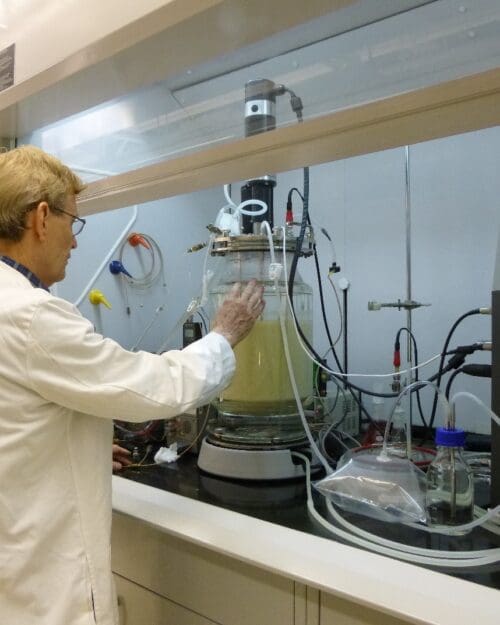June 22, 2022
Purdue Northwest Process to Turn Food Waste into Sustainable Hydrogen Is Licensed to Energy Company
JUNE 9, 2022

The Purdue Research Foundation recently completed a licensing agreement with an international energy company for the commercialization of a new process discovered at Purdue University Northwest (PNW) for the biological production of hydrogen from food waste. A second licensing agreement with a company in Indiana is under negotiation.
This new process uses food waste to biologically produce hydrogen that can be used as a sustainable energy source for producing electricity, as well as for chemical and industrial processes or as a transportation fuel.
Robert Kramer, professor of Physics at PNW and principal investigator for the research, stated that more than 30% of all food, amounting to $48 billion, is wasted in the United States each year. That waste could be used in the developed process to create hydrogen, a sustainable energy source that does not cause environmental issues. When hydrogen is combusted, the only byproduct is water vapor.
“The developed process has a high production rate and can be implemented quickly,” said Kramer. The process is robust, reliable and economically viable for local energy production and processes.”
The research team consisting of Kramer, Libbie Pelter, associate professor of Chemistry at PNW and John Patterson, associate professor in the Department of Animal Sciences at Purdue West Lafayette, has received five grants from the U.S. Department of Energy and the Purdue Research Foundation totaling approximately $800,000 over the last eight years to develop the science and technology that lead to this process. Two patents have been issued for this effort and a third patent is currently in the final stages of approval. Over the next nine months, a scale up test will be conducted. Based upon test results, it is anticipated that construction could start on the first commercial prototype within one year.
Hydrogen is light, storable, transportable, energy-dense and produces no direct emissions of pollutants or greenhouse gases. Unlike fossil fuels, combustion of hydrogen does not produce carbon dioxide or oxides of nitrogen and sulfur. Hydrogen also has a higher energy yield than hydrocarbons, according to the research team.
Currently, annual global hydrogen production is approximately 70 million tons with natural gas as the primary source for this production. The process developed at PNW uses what would otherwise be wasted food to produce hydrogen biologically. As efforts to decarbonize the world economy progress, it is likely that a clean energy medium will be needed and hydrogen is well placed to play this role, according to the research team.
